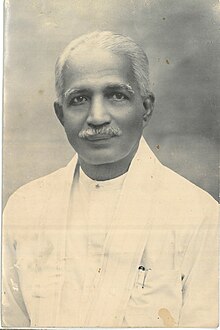This article includes a list of general references, but it lacks sufficient corresponding inline citations. (October 2021) |
C. W. W. Kannangara | |
|---|---|
| සී. ඩබ්ලිව්. ඩබ්ලිව්. කන්නන්ගර | |
 Dr. C. W. W. Kannangara | |
| Minister of Education | |
| In office 1931–1947 | |
| Preceded by | Position established |
| Succeeded by | E. A. Nugawela |
| Minister of Housing and Local Government | |
| In office 1952–1956 | |
| Prime Minister | Dudley Senanayake John Kotelawala |
| Preceded by | Dudley Senanayake |
| Succeeded by | Jayaweera Kuruppu |
| Chief Government Whip | |
| In office 1952–1956 | |
| Prime Minister | Dudley Senanayake John Kotelawala |
| Preceded by | A. E. Goonesinghe |
| Succeeded by | W. J. C. Moonesinghe |
| President of Ceylon National Congress | |
| In office 1931–19?? | |
| Member of the Ceylon Parliament for Agalawatte | |
| In office 1952–1956 | |
| Preceded by | S. A. Silva |
| Succeeded by | Anil Moonesinghe |
| Member of the State Council of Ceylon for Galle | |
| In office 1931–1935 | |
| Preceded by | Constituency created |
| Succeeded by | H. W. Amarasuriya |
| Member of the State Council of Ceylon for Matugama | |
| In office 1936–1947 | |
| Preceded by | D. D. Athulathmudali |
| Succeeded by | Constituency abolished |
| Personal details | |
| Born | Christopher William Wijekoon Kannangara 13 October 1884 Wewala, Hikkaduwa |
| Died | 23 September 1969 (aged 84) Colombo General Hospital, Colombo, Sri Lanka |
| Nationality | Sri Lankan |
| Political party | Ceylon National Congress United National Party |
| Spouse | Edith née Weerasooria |
| Children | Dr. Chithraranjan Swarajweera Wijekoon Kannangara, Kusumawathi Wijekoon Senevirathne |
| Parents |
|
| Residence(s) | No.38 Thimbirigasyaya Road, Colombo 5 |
| Alma mater | Wesleyan Missionary School Randombe, Ambalangoda, Richmond College, Galle |
| Occupation | Politician |
| Profession | Lawyer |
Dr. Cristopher William Wijekoon Kannangara (Sinhala ආචාර්ය ක්රිස්ටෝෆර් විලියම් විජේකෝන් කන්නන්ගර; 18 October 1894 – 23 September 1969) was a Sri Lankan Lawyer and a politician. He rose up the ranks of Sri Lanka's movement for independence in the early part of the 20th century. As a lawyer he defended the detainees that were imprisoned during the Riots of 1915, many of whom were the emerging leaders of the independence movement. In 1931, he became the President of Ceylon National Congress, the forerunner to the United National Party. Later, he became the first Minister of Education in the State Council of Ceylon, and was instrumental in introducing extensive reforms to the country's education system that opened up education to children from all levels of society.
Born in the Southern coastal town of Hikkaduwa, his academic progress at the free Wesleyan school enabled him to win a Foundation Scholarship to Richmond College, Galle, a prestigious secondary school at the time managed by the Methodist church. After leaving school, he worked as a teacher in Mathematics at Wesley College, Colombo and Prince of Wales' College, Moratuwa. He excelled as a lawyer in the Southern Province, eventually getting elected in 1923 as its representative, first to the Legislative Council of Ceylon, and then to its successor the State Council.
Becoming Minister of Education in the State Council, Kannangara and the Committees of Education introduced extensive reforms to Sri Lanka's education system throughout the 1940s.[1][2] He began a Central Colleges scheme, which established high quality secondary schools for the benefit of thousands of underprivileged students in the rural parts of the country. Kannangara was also the Chairman of the Committee that submitted the Free Education Bill for a vote in the State Council, though he was initially opposed to complete free education.[1][2] Kannangara's significant achievements in areas of education have led him to being commonly referred to as the Father of Free Education in Sri Lanka.[1][3][4]
- ^ a b c FORGOTTEN HEROES BEHIND THE TRUE STORY OF FREE EDUCATION AND MISSED OPPORTUNITIES IN SRI LANKA Prabath de Silva, Daily Mirror, 21-07-2020
- ^ a b A fresh look at Kannangara Reforms Eric J. de Silva, The Island/Medium, 13-07-2021
- ^ Context of Educational Reforms Then and Now, Dr. Mohottige Upali Sedere, Educational Resource and Information Center
- ^ Cite error: The named reference
st-10/8/06-groewas invoked but never defined (see the help page).